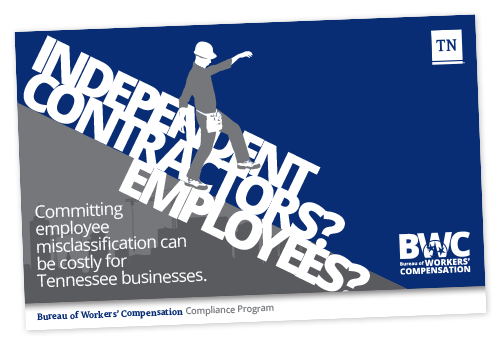Employee Misclassification Education and Enforcement Fund (EMEEF)
Whether intentionally, by agreement, or by misunderstanding there are employers who fail to properly claim a worker as an employee. The EMEEF (Employee Misclassification Education and Enforcement Fund) Program identifies and penalizes employers when a worker who is actually an employee is treated as self-employed or an independent contractor.
Know an employer that is violating the law?
Workers' Compensation
Contact the Compliance Program if you know of an employer who is misclassifying workers to illegally save money on their workers' compensation premiums.
Employee Misclassification Tip Form
Call (800) 332-2667 and ask for the Compliance Program
UI Tax Fraud
UI tax fraud is any deliberate action taken by an employer to evade its full unemployment tax liability.
Employee or Independent Contractor?
(615) 741-2346
If you have questions about the classification of workers for unemployment tax purposes, ask to speak with a tax auditor.
Don't Lose Your Rights.
Employees are disadvantaged when they are misclassified. They are often deprived of minimum wage or overtime pay and may be forced to pay the employer’s portion of withholding taxes. Furthermore, they are left with little recourse if they are injured on the job, as they have no worker’s compensation coverage- and are not protected by occupational safety and health rules which cover only employees. Those same workers have no access to the protection of the:
· Americans with Disabilities Act;
· Age Discrimination in Employment Act and;
· Family Medical Leave Act among other laws.
It is illegal for an employer to require an employee to pay any portion of the business’ workers’ compensation premiums. If unlawful deductions are discovered, civil penalties are assessed by the program in an amount equal to the amount unlawfully deducted. If other unlawful employment practices are discovered, the program takes appropriate action including referrals to other state agencies.
Employers that comply with the law are disadvantaged if they lose business because their competitors misclassify employees. Non-compliant employers often:
· Have lower labor costs. This uneven playing field has a financial impact estimated to be in the tens of millions of dollars.
· Fail to keep records required by law.
· Avoid documenting a worker’s right to work legally in the U.S.
Differences Between an Independent Contractor and an Employee
| An Independent Contractor: | An Employee: |
|---|---|
|
|
Employee Misclassification Advisory Task Force
The Task Force focuses on joint investigation results, progress in other states, efforts taken to study fraud detection software systems, and recommendations for legislative initiatives to enhance enforcement.
Annual Reports
Need More Help?
If you have additional questions, please call 615-532-4812 or 800-332-2667 or contact us by email at wc.info@tn.gov. Find out about other available assistance programs by contacting an ombudsman.
